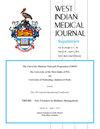从历史角度看加勒比地区的医疗专业精神
IF 0.3
4区 医学
Q4 MEDICINE, GENERAL & INTERNAL
引用次数: 0
摘要
简介:本文探讨了加勒比地区医疗专业化的历史发展,深入了解了塑造我们医生社区的因素,以及在这一日益重要的医疗培训方面的未来发展方向。摘要本文对加勒比地区医学专业和医学专业的发展前景进行了历史概述。两个历史时期,殖民地和后殖民地,将探索在视角上的连续性和变化。最近,人们对医学人文素质被淡化的担忧引起了人们对医学专业化的兴趣,并引发了一场更广泛的医学专业改革运动。医学教育课程正在更新,因为现在医生和学生中公开提出了专业问题,以确保医学专业对社会的服务不受损害。在这种背景下,一些学者认为,对医学职业历史的认识可以在使医学人性化和培养更高的专业性方面发挥重要作用。关于医疗专业性的许多新讨论主要发生在发达国家,即英国和美国。包括加勒比在内的广大发展中世界在这一进程中落后了。缺乏关于加勒比地区医疗专业问题的历史或当代著作。这篇论文将开始填补这一空白。本文章由计算机程序翻译,如有差异,请以英文原文为准。
Historical Perspectives on Medical Professionalism in the Caribbean
Synopsis: This article explores the historical development of medical professionalism within the Caribbean region providing insight into the factors that have shaped our community of physicians and directions for future development in this increasingly important aspect of medical training. Abstract This paper provides an historical overview of the development of perspectives on medical professionalism and the medical profession in the Caribbean. Two historical periods, colonial and postcolonial, will be explored for continuities and changes in perspectives. Recently, concern over the dilution of medicine’s humanistic qualities has caused increased interest in medical professionalism and ignited a wider movement to reform the profession. Medical education curricula are under renovation as issues of professionalism are now being openly raised among medical practitioners and students to ensure that the medical profession’s service to society is uncompromised. In this context, some scholars have felt that awareness of the history of the medical profession could play a significant role in humanizing medicine and fostering greater professionalism. Much of the emerging discussion on medical professionalism has occurred mainly in developed countries, namely Britain and the United States. The wider developing world, including the Caribbean, has fallen behind in this process. There is a lack of historical or contemporary works addressing the medical profession issues of medical professionalism in the Caribbean. This paper will begin to fill this gap.
求助全文
通过发布文献求助,成功后即可免费获取论文全文。
去求助
来源期刊

West Indian Medical Journal
医学-医学:内科
CiteScore
0.20
自引率
0.00%
发文量
0
审稿时长
4-8 weeks
期刊介绍:
The Journal is international in scope, with author and editorial contributions from across the globe. The focus is on clinical and epidemiological aspects of tropical and infectious diseases, new and re-emerging infections, chronic non-communicable diseases, and medical conditions prevalent in the Latin America-Caribbean region, and of significance to global health, especially in developing countries. The Journal covers all medical disciplines, as well as basic and translational research elucidating the pathophysiologic basis of diseases or focussing on new therapeutic approaches, and publishes original scientific research, reviews, case reports, brief communications, letters, commentaries and medical images. The Journal publishes four to six issues and four supplements annually. English is the language of publication but Abstracts are also duplicated in Spanish. Most of the articles are submitted at the authors’ initiative, but some are solicited by the Editor-in-Chief. Unless expressly stated, the Editorial Board does not accept responsibility for authors’ opinions.
All papers on submission are reviewed by a subcommittee. Those deemed worthy for review are sent to two or three reviewers (one of the three might be a statistician if necessary). The returned papers with reviewer comments are reviewed by the Editor-in-Chief. Papers may be rejected, accepted or sent back to authors for revision. Resubmitted papers from authors are reviewed by the Editor-in-Chief and may be sent back to reviewers or a final decision made by Editor-in-Chief. The decision of the Editorial Board is final with regards to rejected articles. Rejected articles will not be returned to the authors. The editorial subcommittee has the right to return sub-standard manuscripts to the authors, rather than passing them on to the reviewers. This implies outright rejection of the manuscript.
 求助内容:
求助内容: 应助结果提醒方式:
应助结果提醒方式:


